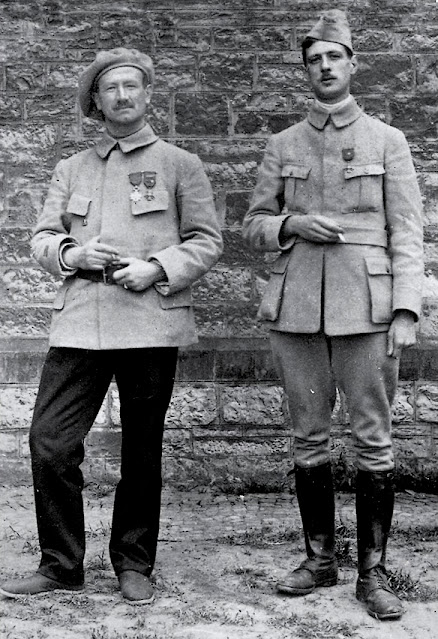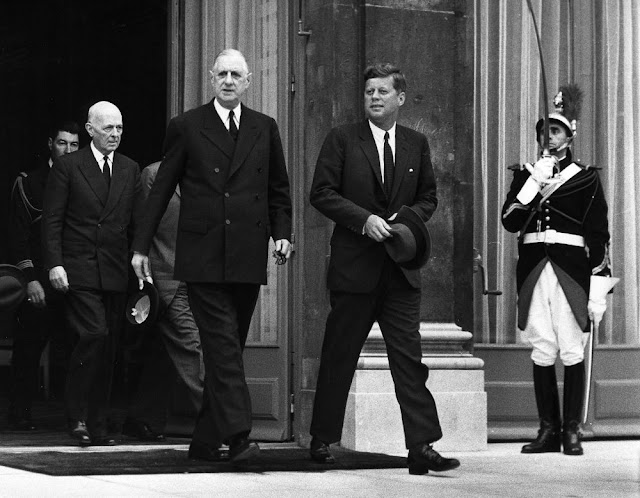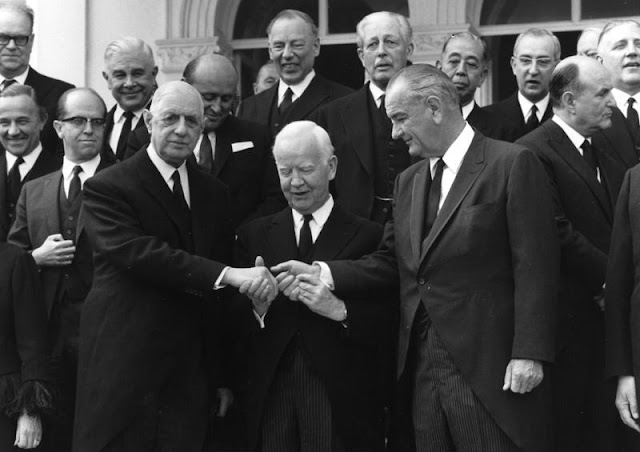--------oOo--------
Continuing a look at the events and people in Billy Joel’s We Didn’t Start the Fire.
Each two lines represent a year.
Little Rock, Pasternak, Mickey Mantle, Kerouac
Sputnik, Chou En-Lai, "Bridge on the River Kwai"
Lebanon, Charles de Gaulle, California baseball
Starkweather, homicide, children of thalidomide
Buddy Holly, "Ben Hur", space monkey, Mafia
Hula hoops, Castro, Edsel is a no-go
U-2, Syngman Rhee, payola and Kennedy
Chubby Checker, "Psycho", Belgians in the Congo
--------oOo--------
1958:
Charles de Gaulle:
--------oOo--------
A WWII photo portrait of General Charles de Gaulle of the Free French Forces and first president of the Fifth Republic serving from 1959 to 1969.
- Charles de Gaulle (1890 – 1970) was a French army officer and statesman who led Free France against Nazi Germany in World War II and chaired the Provisional Government of the French Republic from 1944 to 1946 in order to restore democracy in France.
- The French Fourth Republic was the republican government of France from 27 October 1946 to 4 October 1958, governed by the fourth republican constitution. It was in many ways a revival of the Third Republic that was in place from 1870 during the Franco-Prussian War to 1940 during World War II, and suffered many of the same problems. France adopted the constitution of the Fourth Republic on 13 October 1946.
- Despite the political dysfunction, the Fourth Republic saw an era of great economic growth in France and the rebuilding of the nation's social institutions and industry after World War II, with assistance from the United States provided through the Marshall Plan.
- The Fourth Republic saw frequent changes in government – there were 21 administrations in its 12-year history. Moreover, the government proved unable to make effective decisions regarding decolonization of the numerous remaining French colonies. After a series of crises, most importantly the Algerian crisis of 1958 and Algeria’s war of independence, the Fourth Republic collapsed.
- Frustrated by the return of petty partisanship in the new Fourth Republic, de Gaulle had resigned in early 1946 but continued to be politically active as founder of the Rassemblement du Peuple Français (RPF; "Rally of the French People"). He retired in the early 1950s and wrote his War Memoirs, which quickly became a staple of modern French literature.
- De Gaulle returned from retirement to preside over a transitional administration that was empowered to design a new French constitution. The Fourth Republic was dissolved on 5 October 1958 following a public referendum which established the modern-day Fifth Republic with a strengthened presidency.
- He managed to keep France together while taking steps to end the Algerian war, much to the anger of the Pieds-Noirs (ethnic French born in Algeria) and the armed forces; both previously had supported his return to power to maintain colonial rule. He granted independence to Algeria and acted progressively towards other French colonies.
- In the context of the Cold War, de Gaulle initiated his "politics of grandeur", asserting that France as a major power should not rely on other countries, such as the United States, for its national security and prosperity. To this end, he pursued a policy of "national independence" which led him to withdraw from NATO's integrated military command and to launch an independent nuclear strike force that made France the world's fourth nuclear power.
- He restored cordial Franco-German relations to create a European counterweight between the Anglo-American and Soviet spheres of influence.
- De Gaulle opposed any development of a supranational Europe, favouring Europe as a continent of sovereign nations.
- De Gaulle openly criticised the United States intervention in Vietnam and the "exorbitant privilege" of the United States dollar.
- In his later years, his support for the slogan "Vive le Québec libre" and his two vetoes of Britain's entry into the European Economic Community generated considerable controversy in both North America and Europe.
- Although reelected to the presidency in 1965, he faced widespread protests by students and workers in May 1968, but had the Army's support and won an election with an increased majority in the National Assembly.
- De Gaulle resigned in 1969 after losing a referendum in which he proposed more decentralisation.
- He died a year later at his residence in Colombey-les-Deux-Églises, leaving his presidential memoirs unfinished.
- In his lifetime, de Gaulle survived 31 documented assassination attempts. He is the target in the book and film Day of the Jackal.
--------oOo--------
Gallery:
De Gaulle in 1897, aged 7
Captain De Gaulle with another French POW in Poland, 1916
Charles de Gaulle (far right) with Andrew McNaughton, Władysław Sikorski, and Winston Churchill
1958 Time Man of the Year
The first meeting between David Ben-Gurion and de Gaulle at Élysée Palace, 1960
Charles de Gaulle's motorcade passes through Isles-sur-Suippe (Marne), the president salutes the crowd from his famous Citroën DS
President John F. Kennedy and de Gaulle at the conclusion of their talks at Elysee Palace, 1961
De Gaulle and Lyndon B. Johnson meeting at Konrad Adenauer's funeral in 1967, with President of West Germany Heinrich Lübke (center)
--------oOo--------
Following is an anecdote, previously posted in Bytes, and of uncertain origin. It has been widely quoted and may be an urban myth, Snopes.com does not verify whether it is truth or fiction.
The exchange is frequently said to have taken place between Madame de Gaulle and British Prime Minister Harold Macmillan or his wife, Lady Dorothy Macmillan. One variant has Harold Macmillan, not understanding what Madame de Gaulle meant to say, "Well, yes, not much time for that now."
When Charles de Gaulle decided to retire from public life, the American ambassador and his wife threw a gala dinner party in his honour. At the dinner table the Ambassador's wife was talking with Madame de Gaulle."Your husband has been such a prominent public figure, such a presence on the French and International scene for so many years! How quiet retirement will seem in comparison. What are you most looking forward to in these retirement years?""A penis," replied Madame de Gaulle.A huge hush fell over the table. Everyone heard her answer . . . and no one knew what to say next.Finally, Charles leaned over to his wife and said, "Ma cherie, I believe zee Americans pronounce zat word 'appiness.'"
--------oOo--------









No comments:
Post a Comment
Note: Only a member of this blog may post a comment.